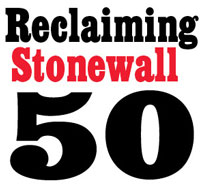 Fifty years ago, in the early morning hours of June 28, 1969, a motley multitude of queer folks fought back. The stage was the Stonewall Inn, a popular Mafia-owned gay bar on Christopher Street in New York City’s West Village. The spectacle was a police raid, which had become an increasingly routine fact of queer life during the 1960s. It was summer, people were hot, and the nation was pulsing with protest.
Fifty years ago, in the early morning hours of June 28, 1969, a motley multitude of queer folks fought back. The stage was the Stonewall Inn, a popular Mafia-owned gay bar on Christopher Street in New York City’s West Village. The spectacle was a police raid, which had become an increasingly routine fact of queer life during the 1960s. It was summer, people were hot, and the nation was pulsing with protest.
Stonewall was hardly the first confrontation between state authority and gay, lesbian, bisexual, trans, and queer citizens. In many ways, however, it was the most spectacular and sustained, involving thousands of ordinary people—diverse in color, class, condition, and conviction—who participated in six consecutive nights of violent resistance against police repression and so much else. Though the foundations of what would become the LGBTQ movement were built during the decades preceding those fateful nights, Stonewall was an unmistakably radical moment, one that helped to unleash a fabulous new ferocity. As the pioneering gay historian Martin Duberman describes it, “Stonewall is the emblematic event in modern [queer] history…an empowering symbol of global proportions.”
We may never know exactly what happened at Stonewall. Despite admirable efforts to get the basics right, eyewitness accounts and historical interpretations differ widely. Over the last 50 years, people have debated nearly every aspect of Stonewall: What caused it? Why did it happen then and there? How did it unfold? Who was (and wasn’t) there? How many people participated? How many people were arrested? Who threw the first punch or brick or Molotov cocktail?
We even disagree about what to call it: a riot, an uprising, or a rebellion—or the beginning of a revolution? We may well be debating these matters for another 50 (or 500) years, but this much we do know: Stonewall packed a punch and made an indelible mark on future generations of LGBTQ activism.
Like many of us, I am one of Stonewall’s children. I came into the world in June 1971, came of age in the crucible of the first decade of the AIDS crisis, and came out as an adult gay/queer man at the beginning of the 21st century. As I say to my students, I wasn’t alive for Stonewall, was too young to experience the full brutality of AIDS, and am too old to believe that the aisle to the altar is the pathway to the promised land. Still, I have lived during the Stonewall, AIDS, and marriage generations, which means that I have been able to witness a world finally begin to embrace queer love, to mourn the loss of too many queer people, and to believe in queer liberation.
For half a century, queer people have shown me, time and again, that liberation is constituted by the freedom to live fully on our own terms, the equality to enjoy the full rights and opportunities of citizenship, and the dignity to be accepted and respected by others for who and how we are. If there are any people on earth who don’t want freedom, equality, and dignity, I have yet to meet them.
Popular
"swipe left below to view more authors"Swipe →
Anniversaries are occasions for remembrance, even pride and celebration, but they should also be moments of reckoning, which offer us the opportunity to reflect critically on where we come from, where we are, and where we go from here. These are also moments for us to redefine who we are, to reimagine the kind of world we’d like to build together, and to rededicate ourselves to that tough and vital work.
To help us reckon with the 50th anniversary of Stonewall, The Nation invited a remarkable group of LGBTQ activists, artists, and academics to reflect on its many legacies. Ranging in age from 23 to 88 years old, the participants in “Reclaiming Stonewall” represent the stunning diversity of our community across generations and living at the intersections of many identities and experiences. Combining the personal and the political, this collection of living queer histories is something of an archive of our moment, when many of us are grappling with what might be called the paradox of progress: the coexistence of important changes—in courtrooms and legislatures, hearts and minds—with seemingly intractable challenges.
After all, we still live in a nation and world where queer people experience disproportionate forms of hatred and violence, prejudice and discrimination. We still exist in a country where too many queer people can be denied housing and employment, where too many queer people are incarcerated and living in poverty, where too many queer youths experience bullying in schools and living on the streets, and where too many queer folks—especially trans people and people of color—are subjected to surveillance and violence by the state and fellow citizens.
In this country, HIV/AIDS is still a crisis, and too many people struggle with access to treatment; too many queer elderly are forgotten; too many lesbian, bisexual, trans, queer, and nonbinary people are invisible; too many queer people of color and immigrants experience racism and xenophobia; intimate-partner violence and internalized self-loathing are too prevalent in our relationships; religious bigotry persists; and too many people within our community embrace “progress” without confronting these many realities.
As we reckon with the 50th anniversary of Stonewall, let us heed all these voices and ask, “What still needs to be done?” If the legacy and inheritance of Stonewall mean anything, it’s that our fight is far from over and that our collective struggle for liberation—for everyone—must continue.


